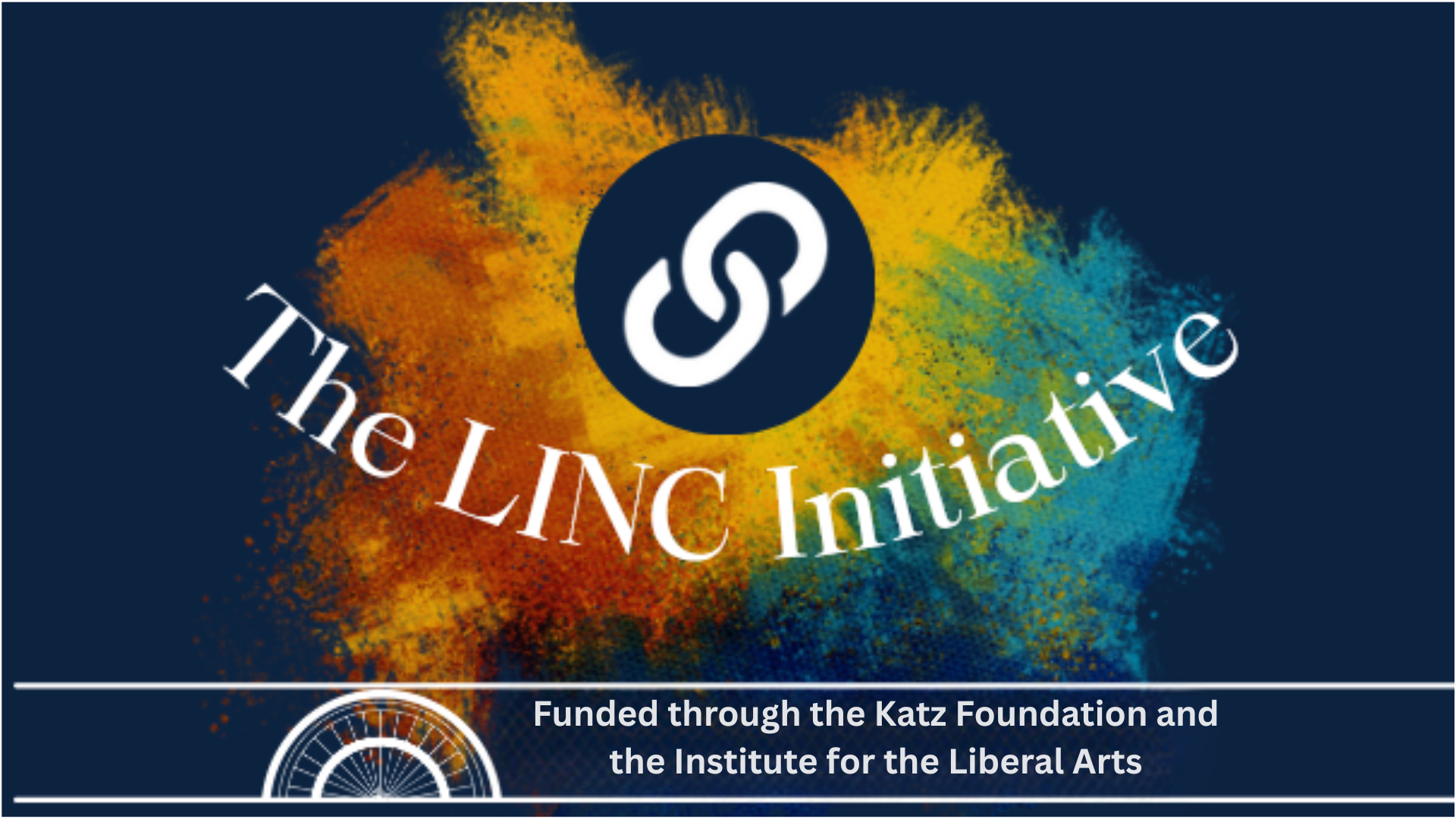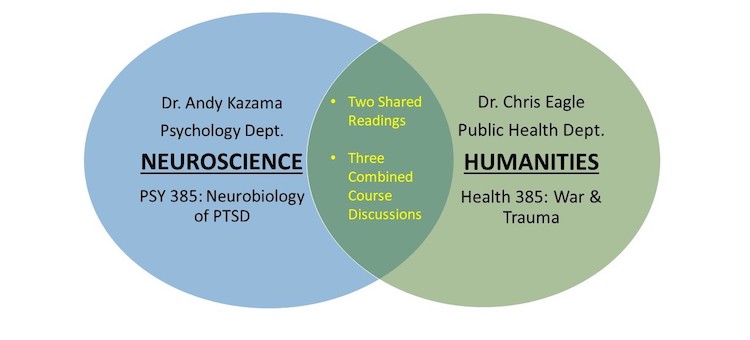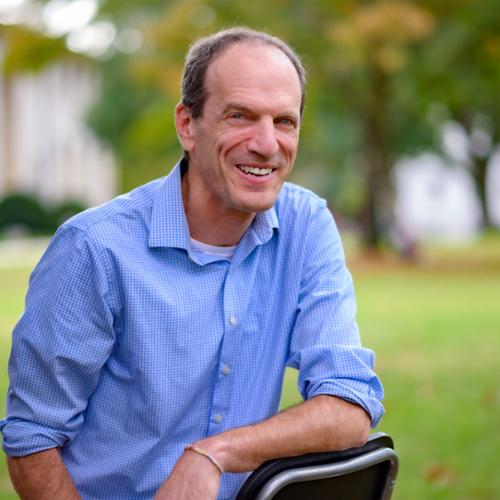
LINC Courses
LINC courses pair faculty from different disciplines, each teaching their own independent course, to create points of intersection, or links, between the two courses. Faculty and students in both classes collaborate on a few common readings, presentations, projects, etc.
LINC applications are currently closed.
Why LINC?
Back to topThe LINC initiative seeks to unlock the powerful synergy of intellectual and social inclusivity in the classroom to drive innovation at Emory University. We see interdisciplinary work as a fundamental form of intellectual inclusivity. Working across and between disciplines offers a multiplicity of points of entry, maximizing participants’ ability to find and express their perspectives and interests.
We see broad participation and engagement, by both students and faculty, as a key measure of social inclusivity. We propose that intellectual inclusivity, expressed through path breaking interdisciplinary practice, promotes social inclusivity by facilitating and attracting the participation of people from a wide range of identities, perspectives, and approaches. Through LINC courses that leverage existing courses to create points of intersection, we will assess whether intellectual inclusivity promotes social inclusivity and fosters innovation.
The LINC Workshop
Back to topAs a key component of achieving this vision, we are offering a workshop that will lead directly to faculty teaching a paired LINC course in the 2026-27 AY. The LINC Initiative Faculty Workshop will run over the course of two days: April 28th and August 24th, 2026. New participants will receive a $1,000 stipend.
The workshop will leverage existing course offerings by preparing faculty pairs from different disciplines to create points of intersection, or links, between the two courses that encourage a diverse range of perspectives and thus lead to a more inclusive classroom. Each course will remain independently taught through the home department, but each faculty member will revise their syllabus to be more interdisciplinary and inclusive, and to include several points of convergence with their partner LINC course, such as common readings, presentations, projects, etc., on which faculty and students in both classes will cooperate/coordinate.
Previous LINC Courses
Back to top- Ecology and Environmental Policy
- Instructors: Miguel Reyes, Stacy-Ann Robinson
- Psychology of Prejudice and Language Prejudice
- Instructors: Jessica Barber, Susan Tamasi
- Literacy: Cultural Rhetorics and Africana Methods
- Instructors: Vani Kannan, Toivo Asheeke (GSU)
- Concepts in Indigenous Sovereignty and Food & Forests
- Instructors: Malinda Lowery, Megan Mucioki
- Art of Attention and Art of Listening
- Instructors: Shiv Subramanium, Maho Ishiguro
- Religion, Self-Care & Consumerism and The Psychology of Wellbeing
- Instructors: Rose Deighton-Mohammed, Elaine Johnson
- Textbook to Table & Sustainable Food and Italy & Sustainable Food Systems
- Instructors: Jill Welkley, Simona Muratore, Emily Burchfield
- Organismal Form & Function and Hip Hop & Identity
- Instructors: Kate O’Toole, Julio Medina
- Sociology & Creativity and Ballet Culture: Pain and Pleasure
- Instructors: Sonal Nalkur, Mara Mandradjieff
- Spanish Translation and Power of Storytelling
- Instructors: Lisa Dillman, Kim Loudermilk
- Epigenetics & Human Diseases and History of Hunger
- Instructors: Arri Eisen, Tom Rogers
- Visual Culture and Environmental Justice
- Instructors: Julia Tulke, Jola Ajibade
- Indigenous Literature Since 1850 and Indigenous Music of the Artic
- Instructors: Mandy Suhr-Sytsma, Heidi Senungetuk
- Intro to American Studies and Intro to General Sociology
- Instructors: Kim Loudermilk, Sonal Nalkur
- Social Justice in Italy and Beyond & Advanced Neuroethics
- Instructors: Christine Ristaino, Gillian Hue
- Interdisciplinary Foundations and Astrophysics with Lab
- Instructors: Peter Wakefield, Erin Bonning
- History of the American Languages and Acting: Scene Work
- Instructors: Susan Tamasi, Lisa Paulsen
- Translation: Who, What, How? and Computational Linguistics
- Instructors: Lisa Dillman, Jinho Choi
- Media Texts and Technologies & Digital Inequality
- Instructors: Dan Reynolds, Cassidy Puckett
- Textbook to Table and At the Italian Table: Sustainable Food & Culture of Italy
- Instructors: Jill Welkley, Simona Muratore
- Language & Race in Atlanta and National Politics of the United States
- Instructors: Marjorie Pak, Alex Bolton
- A History of Hunger and Cell Biology
- Instructors: Thomas Rogers, Arri Eisen
- Comparative Vertebrate Anatomy and Roman Law
- Instructors: Laura Catano, Emily Master
- Chemistry and Theater Studies
- Instructors: David Lynn, Lydia Fort
- Making the International City, Atlanta and Atlanta Architecture in the Modern Era
- Instructors: Yami Rodriguez, Christina Crawford
- Dance as Cultural Knowledge and Poetry of Gods and Kings
- Instructors: Maho Ishiguro, Harshita Kamath
- Introduction to Computer Science 1 and Elementary Italian Language & Culture
- Instructors: Davide Fossati, Angela Procarelli
- Economics and Psychology & Advertising in American Culture
- Instructors: Kelly Lanier, Kim Loudermilk
- Freedom and Authority
- Instructors: Peter Wakefield
- Neurobiology of PTSD and War & Trauma
- Instructors: Andy Kazama, Chris Eagle
- Music & Education and Music, Film & Politics
- Instructors: Cynthia Willet, Laura Emmery
- Dance Literacy and Differential Equations
- Instructors: Lori Teague, Manuela Manetta
- Concepts in Biology with Bio Lab 120 and Theater Workshop in Spanish
- Instructors: Edward Nam, Elva Gonzalez and Mary Lynn Owen
- Heimut & Alienation and Intro to Atmospheric Chemistry
- Instructors: Carolina Shaumann, Eri Saikawa
- Intro to Psychology and Comedy (Terence)
- Instructors: Elizabeth Kim, Niall Slater
A LINC example
Back to top
Professor Chris Eagle in the Center for the Study of Human Health plans to teach an upper level seminar entitled: War & Trauma. The course covers cultural and clinical ideas about war and trauma from WWI to the present, and reflects on how different forms of evidence (i.e., fiction, poetry, testimonials, theoretical essays, and clinical case-studies) can reveal different facets of the traumatic experience.
Professor Andy Kazama in the Psychology Department plans to teach an upper level seminar entitled: The Neurobiology of PTSD. The course covers various neurobiological aspects of Post-Traumatic Stress Disorder using peer-reviewed articles drawn from a wide variety of biomedical fields (i.e.., genetics, hormones, brain structures, and current treatment approaches to the disorder).
Drawing from their respective backgrounds in Literature and Neuroscience, Professors Eagle and Kazama have LINC-ed their courses with three points of intersection distributed at the beginning, middle and end of the semester. They will assign the same readings and host combined class discussion sessions highlighting the importance of interdisciplinarity and the advantages of drawing on diverse ideas to spark innovation and gain a fuller understanding of traumatic experiences.
